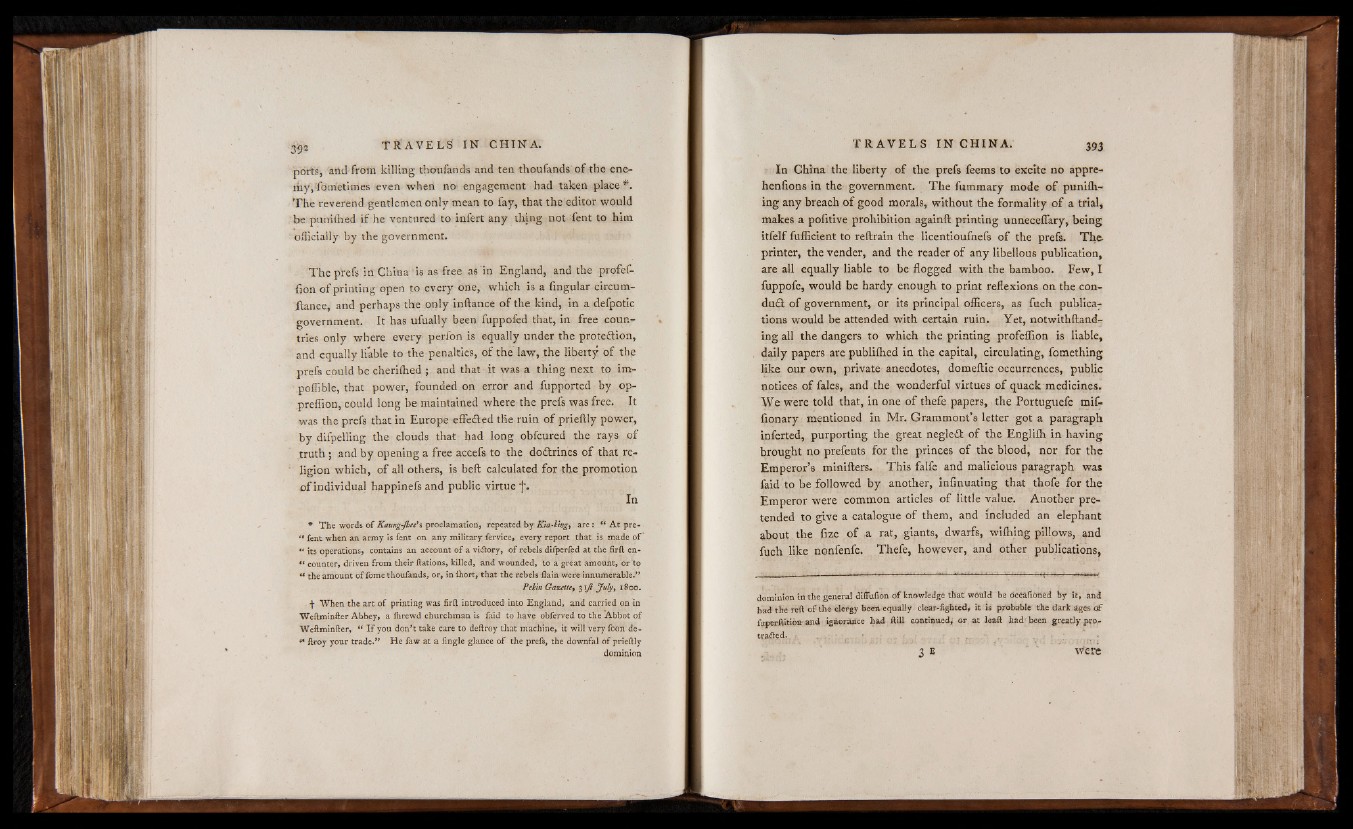
ports, and from killing thoufands and ten thoufands o f the ene-
ihy ,:fQinetimes even when no- engagement had taken place*.
The reverend gentlemen only mean to fay, that the editor would
be puniihed i f he ventured to infert any thing not fent to him
officially by the government.
The prefs in China is as free a6 in England, and the profef-
fion o f printing open to every one, which is a Angular circum-
itance, and perhaps the only inftance o f the kind, in a defpotic
government. It has ufually been fuppofed that, in free countries
only where every perfon is equally under the protection,
and equally liable to the penalties, o f the law, the liberty o f the
prefs could be cheriffied ; and that it was a thing next to im-
poffible, that power, founded on error and fupported by op-
preffion, could long be maintained where the prefs was free. It
was the prefs that in Europe effected the ruin o f prieftly power,
by difpelling the clouds that had long obfcured the rays o f
truth ; and by opening a free accefs to the doctrines o f that re.-
ligion which, o f all others, is heft calculated for the promotion
o f individual happinefs and public virtue f .
In
# The words of Kaung-Jhee*s proclamation, repeated by Kia-king, are : ** A t pre-
“ fent when an army is fent on any military fervice, every report that is made o f
“ its operations, contains an account o f a vi&ory, o f rebels difperfed at the firft en-
« counter, driven from their ftations, killed, and wounded, to a great amount, or to
« the amount of fome thoufands, or, in Ihort, that the rebels ilain were innumerable.”
Pehin Gazette, 3 ijl July, 1800.
f When the art o f printing was firft introduced into England, and carried on in
Weftminfter Abbey, a fhrewd churchman is laid to have obferved to the Abbot of
Weftminfter, “ I f you don’t take care to deftroy that machine, it will very foon de-
ftroy your trade.” He faw at a fingle glance o f the prefs, the downfal of prieftly
dominion
In China the liberty o f the prefs feems to excite no appre-
henfions in the government. The fummary mode o f punching
any breach o f good morals, without the formality o f a trial,
makes a pofitive prohibition againft printing unneceffary, being
itfelf fufficient to reftrain the licentioufnefs o f the prefs. The-
printer, the vender, and the reader o f any libellous publication,
are all equally liable to be flogged with the bamboo. Few, I
fuppofe, would be hardy enough to print reflexions on the conduit
o f government, or its principal officers, as fuch publications
would be attended with certain ruin. Yet, notwithftand-
ing all the dangers to which the printing profeffion is liable,
daily papers are publilhed in the capital, circulating, fomething
like our own, private anecdotes, domeftic occurrences, public
notices o f fales, and the wonderful virtues o f quack medicines.
W e were told that, in one o f thefe papers, the Portuguefe mif-
fionary mentioned in Mr. Grammont’s letter got a paragraph
inferted, purporting the great negleil o f the Engliih in having
brought no prefents for the princes o f the blood, nor for the
Emperor’s minifters. This falfe and malicious paragraph was
faid to be followed by another, infinuating that thofe for the
Emperor were common articles o f little value. Another pretended
to give a catalogue o f them, and included an elephant
about the fize o f a rat, giants, dwarfs, wiihing pillows, and
ftjch like nonfenfe. Thefe, however, and other publications,
dominion in the general diffufion o f knowledge that would be dccafioiled by it, and
had the reft o f the clergy been equally clear-fighted, it is piobable the dark ages of
fujjerftition and ignorance had ftili continued; or at leaft had been greatly pror
tra#£d. r • .... Lj . ~ _ -•
3 e " c were